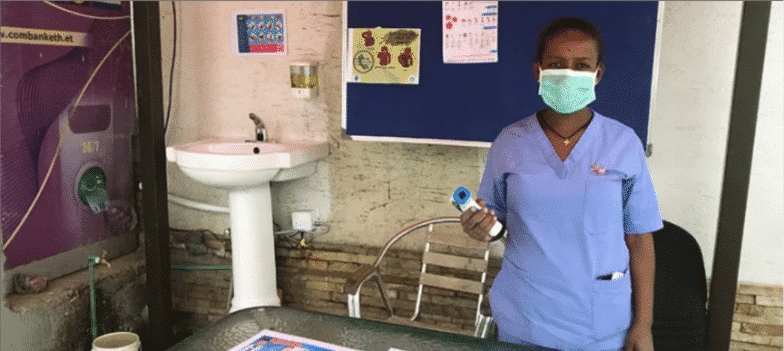
As the primary bearer of the responsibility to govern, states are required to provide political, social and economic goods and services to their people. Lessons emerging from the COVID-19 pandemic in Africa demonstrate that without capable, accountable, inclusive and participatory governments, effectively addressing contemporary and emerging challenges such as pandemics will remain a pipe dream.
Introduction
Since March 2020, when African states started reporting COVID-19 cases, critical governance concerns began to rise. One issue is how to strike the right balance between upholding democratic governance, respect for human rights and effectively addressing the spread and impact of COVID-19. Due to weak state capacities, accountability challenges and constrained state-society relations in some African states, there were fears that COVID-19 would have especially pronounced and devastating effects on the continent. While the impact of COVID-19 in Africa has not been greater than in the rest of the world, the pandemic’s vast political and socio-economic impact has brought to the fore the critical role of the state, especially in effective management of crises, disasters and public health emergencies.
Role of the state in governance in Africa
As primary bearers of the responsibility to govern, states are required to provide political, social and economic goods and services to their people. In times of crisis, like the COVID-19 pandemic, this responsibility is accentuated, because people’s livelihoods are interrupted and citizens must rely mainly on the state to cushion them against devastating effects. States are expected to take necessary measures to arrest the impact of a crisis and ensure effective service delivery, while at the same time maintaining good state-society relations. To be effective, states need to uphold the rule of law, respect fundamental human rights and freedoms, be accountable and ensure inclusive and participatory democratic governance.
Governance deficit
While some countries, such as Senegal, Ghana, Nigeria, South Africa, Kenya, Uganda and Rwanda, adopted restrictive measures like curfews and lockdowns, others such as Tanzania and Zambia, opted for partial restrictions and remained largely open. Faced with attendant socio-economic costs, many began easing lockdowns and cautiously reopening their economies. In states such as Nigeria, Kenya, Zimbabwe and South Africa, the pandemic has revealed an underbelly of governance deficits, illustrated by allegations of rampant theft of COVID-19 funds and resources, violation of human rights and impunity of security forces deployed ostensibly to keep the peace and maintain law and order (APRM 2020).
To address these governance deficits, both during the COVID-19 crisis and in the post-pandemic recovery period, African states, in line with their obligations under international human rights law, should commit to upholding the rule of law, accountability, democratic processes and good governance. The effectiveness of governments in responding to the challenges posed by the pandemic will depend on their respect for human rights, transparency, accountability and civic engagement, which can be facilitated by technology, innovation and digital governance.
State-society relations
COVID-19 has illuminated the importance of state-society relations and the need for trust between citizens and their government. The extent to which government directives are adhered to depends on the extent that society and the population (i) believe and trust their government, (ii) participate and feel included in their government’s decision-making processes and (iii) feel there is fair and just accountability for transgressors, irrespective of their socio-economic and political status.
In a preliminary report on Africa’s governance response to the COVID-19 crisis, the African Peer Review Mechanism observed that most citizens of African states did not consider the quarantine and lockdown measures to be legitimate (APRM 2020). Yet, to be effective and resonate with beneficiaries, governance measures must be trusted and inclusive, and have empathy for those who are governed. African states should therefore guard against imposing measures that undermine democratic processes in the short and long term and impair trust between them and their people.
Capacity of the state in service delivery
COVID-19 has also highlighted capacity constraints in the delivery of essential public goods and services. The virus has adversely affected infrastructure, security, public order, health, social protection and assistance, education, housing, labour, and indeed every element of societal well-being. The pandemic has impacted people’s livelihoods, as resources are diverted to address the spread of the virus. Tremendous economic downturns and job losses have exacerbated inequalities. Education and much needed skills training have been deferred in most countries. The resulting skills gaps, capacity deficits and lost jobs and economic opportunities will require that states be creative in governance in the future (Jayaram et al. 2020). Importantly, states will have to rely more on technology, innovation and digital governance to render public services and goods. To do so, states in collaboration with the private sector and international development partners, should put in place measures to ensure that the digital divide is addressed.
Role of the African Union in supporting member states in governance
COVID-19 has equally reaffirmed that states cannot govern effectively and deliver for their citizens on their own. The cross-border nature of the issues affecting citizens requires a regional approach and strategies to address contemporary global challenges effectively. The resources required to deliver services, prevent pandemics and build lasting capacities are best mobilised through partnerships and regional frameworks.
Africa’s ‘Agenda 2063’ underscores the need for African solutions to regional challenges. During COVID-19, the African Centres for Disease Control and Prevention spearheaded continental efforts to deal with the virus. Mobilisation of resources, including distribution of needed technologies and personal protective equipment across the continent, showed the significant potential of regional governance. However, in most countries the socio-economic cost of the virus has diminished national reserves and GDPs. This has limited access to credit and heightened calls for regional approaches to enhance fiscal space, including domestic resource mobilisation (DRM), debt relief and the stemming of illicit financial flows. In the post-pandemic recovery period, the AU through its Advisory Board on Corruption, and in collaboration with the private sector, civil society and relevant international actors, will need to support member states to address these challenges and to adopt and implement effective DRM mechanisms.
With a focus on regional integration, the AU can play an important role in enhancing member states’ efforts to address the ramifications of COVID-19. Using its convening power and political leverage, the AU can help its member states put in place foundations for a robust post-pandemic recovery, both short term and long term. This should include support for strengthening the social contract between states and their people, supporting states in protecting the livelihoods of vulnerable and marginalised groups, supporting initiatives to strengthen democratic governance, and establishment of strong institutions that respect the rule of law and human rights. In particular, the AU needs to develop a robust continental framework for disaster preparedness and management and urge its member states to adopt and implement it. Importantly, the AU should encourage its members to ratify and domestically apply the Africa Risk Capacity (ARC) treaty.
Global partnerships and collaboration
COVID-19 has reaffirmed the need for global partnerships and collaboration to prevent, mitigate and resolve global threats to humanity, such as pandemics, climate change, conflict and insecurity (World Bank 2020). The role played by global entities including the United Nations (UN) and European Union (EU) and bilateral actors such as China, Russia and the United States, have profound impact on global governance, though they may also compound global challenges. As such, global partnerships and collaborations as envisioned in Sustainable Development Goal 17, such as the upcoming AU-EU Partnership Strategy, remain invaluable in strengthening the role of the state in governance and in the fight against the spread and impact of COVID-19.
Global solidarity and cooperation are critical, considering that no single country is capable of preventing or fully controlling the COVID-19 pandemic on its own. Therefore, there is a need to collaborate and build global synergies to address the impact of the virus. Collaboration can ensure coordination and synergy, while preventing duplication, reducing overlap and enhancing resource pooling. African states have received support from global institutions and partners to curb the spread of COVID-19 and its impacts. For instance, several African states received support from China and grants from the World Bank to fund their pandemic responses (APRM 2020). The EU has reallocated its pledged support to Africa to include €10 million to support implementation of the Africa Joint Continental Strategy for COVID-19 Outbreak.
However, the impact of global efforts to support African states may be impaired by the fact that global governance institutions are themselves struggling under the weight of COVID-19’s impact. To overcome this challenge, global actors, including the EU, international financial institutions and the UN must reform and strengthen their own institutions, systems and processes to render them more proactive, responsive and inclusive, reflecting the values they espouse.
Emerging lessons
Since the state has the primary responsibility to govern, lessons emerging from COVID-19 call for deep reflection on the imperative of revitalising the role of the state in governance in Africa. Without capable, accountable, inclusive and participatory governments, addressing contemporary and emerging challenges such as pandemics will remain a pipe dream. Inadequate service delivery remains one of the greatest threats to sustainable development, peace and security in Africa. In this regard, embracing and adopting technology, innovation and digital governance offer unique opportunities for states.
Pervasive impunity, lack of accountability and corruption in both the public and private sectors continue to threaten effective governance in several African states. It is therefore imperative to inculcate trust between citizens and their government and uphold the social contract through inclusive and participatory governance that delivers. This is particularly true for those on the margins. As Mahatma Gandhi and Nelson Mandela both reiterated, the true measure of a society is how it treats its most vulnerable populations, including women, children, youths and persons with disabilities. Governance should be anchored on service delivery, respect for human rights, upholding the rule of law, constitutionalism and transparency. This requires, among other things, access to credible information, data and statistics.
Conclusion
To enhance effective governance, states should start by addressing governance deficits and redefining and prioritising improvement of state-society relations, as well as revitalising the social contract. This should include abolishing impunity, corruption and accountability deficits based on human rights principles and focusing on the most marginalised segments of the population. Effective state governance requires the solidarity, cooperation and collaboration of regional and global actors. Accordingly, beyond supporting the priorities of states and regional bodies such as the AU, regional and global actors should step forward to contribute to alleviating the socio-economic costs of COVID-19, including debt relief measures.
References
APRM. 2020. Africa’s Governance Response to COVID-19: Preliminary Report 2020. Johannesburg: African Peer Review Mechanism.
Jayaram K, Leke A, Ooko-Ombaka A, and Sun YS. 2020. “Finding Africa’s path: Shaping bold solutions to save lives and livelihoods in the COVID -19 crisis” McKinsey & Company.
World Bank. 2020. Helping Countries Navigate a Volatile Environment.









